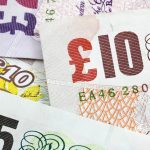Japanese yen appreciated after BoJ Governor Speech.
The Japanese yen (JPY) strengthened against the US dollar (USD) following the release of the National Consumer Price Index (CPI) inflation statistics and a statement by Bank of Japan (BoJ) Governor Kazuo Ueda in Parliament on Friday. According to Ueda, “the BoJ raised rates in July as the economy and inflation moved largely in line with forecasts.”
Japan’s National CPI increased by 2.8% YoY in July, remaining at its highest level since February.
Governor of the Bank of Japan, Ueda, also said that If the economy and inflation continue to perform as expected, the attitude on adjusting monetary easing will remain unchanged. Ueda stated that recent BoJ policy actions have been appropriate, but cautioned that specifying the future policy route may lead to unwarranted speculation.
Learn more about BoJ Ueda’s speech: The central bank raised rates in July, as the economy and inflation advanced broadly in line with forecasts.
The USDJPY pair falls as the US Dollar is under pressure from lower Treasury yields. The Greenback, on the other hand, gained momentum following the mixed S&P Global Purchasing Managers Index (PMI) data issued on Thursday.
Fed Chair Powell may make a comment about the possibility of interest rate decreases at the Jackson Hole Symposium.
Furthermore, the US Federal Reserve (Fed) Chair, Jerome Powell, is scheduled to appear at the Jackson Hole Symposium later on Friday. Powell may deliver a statement. concerns the prospect of interest rate decreases in the United States (US), which is widely anticipated by market investors.
Daily Market Movers: Japanese Yen Advances Following BoJ Governor Ueda’s Speech.
Japanese yen (JPY) strengthened against the US dollar. Governor Kazuo Ueda of the Bank of Japan (BoJ) told the Japanese parliament on Friday that he is “not considering selling long-term Japanese government bonds (JGBs) as a tool for adjusting interest rates.” He stated that any reduction in JGB purchases would only account for 7-8% of the balance sheet, which is a negligible decrease. Ueda went on to say that if the economy performs as expected, there may be a period in which interest rates are raised somewhat.
In July, Japan’s National Consumer Price Index climbed by 2.8% year on year, continuing its current trend. for the third straight month and at its highest level since February. Additionally, the National CPI excluding Fresh Food increased by 2.7%, the highest reading since February, in line with predictions.
US Composite PMI fell to 54.1 in August, a four-month low, from 54.3 in July.
The US Composite PMI fell to 54.1 in August, a four-month low, from 54.3 in July, but it still above market estimates of 53.5. This demonstrates sustained expansion in US business activity, with 19 consecutive months of growth.
The S&P Global US Services PMI rose to 55.2 in August 2024 from 55.0 in July, surpassing expectations for a decline to 54.0. Meanwhile, the Manufacturing PMI decreased to 48.0 in August from 49.6 the previous month, falling short of market forecasts of 49.6, and suggesting the second consecutive downturn in US factory activity at the This is the sharpest rate this year.
On Thursday, Federal Reserve Bank of Boston President Susan Collins voiced confidence that the US central bank can reduce inflation without precipitating a recession and urged support for starting interest rate cuts next month. Collins told Reuters at Jackson Hole, “I think there’s a clear path to achieving our goals without an unnecessary downturn, and with a labor market that remains healthy.”
Kansas City Fed President Jeff Schmid stated in an interview with CNBC at Jackson Hole that he is closely reviewing the factors driving the rise in the unemployment rate and will rely on data to decide whether to support a rate cut next month.
FOMC minutes from the July policy meeting, most Fed members agreed last month that they would likely lower their benchmark interest rate at the September meeting.
According to the FOMC minutes from the July policy meeting, most Fed members agreed last month that they would likely lower their benchmark interest rate at the September meeting as long as inflation remained low.
Japan’s Merchandise Trade Balance slid into a deficit of ¥621.84 billion in July, reversing the surplus of ¥224.0 billion reported in June and falling short of market expectations of a ¥330.7 billion shortfall. In July, Japan’s imports increased by 16.6% year on year to a 19-month high of ¥10,241.01 billion, up from 3.2% in June. Exports climbed by 10.3% year on year to a seven-month high of ¥9,619.17 billion, falling shy of market expectations of 11.4%.









